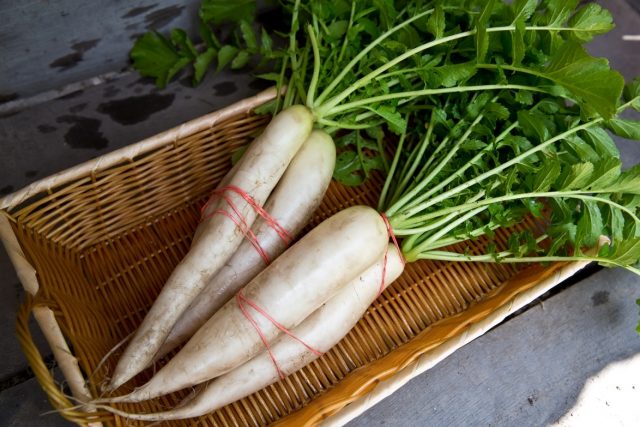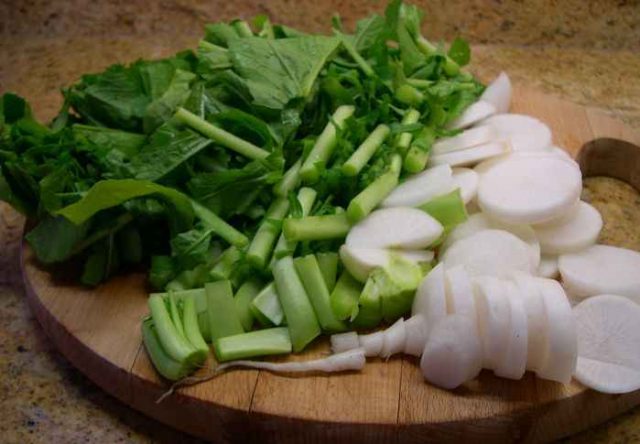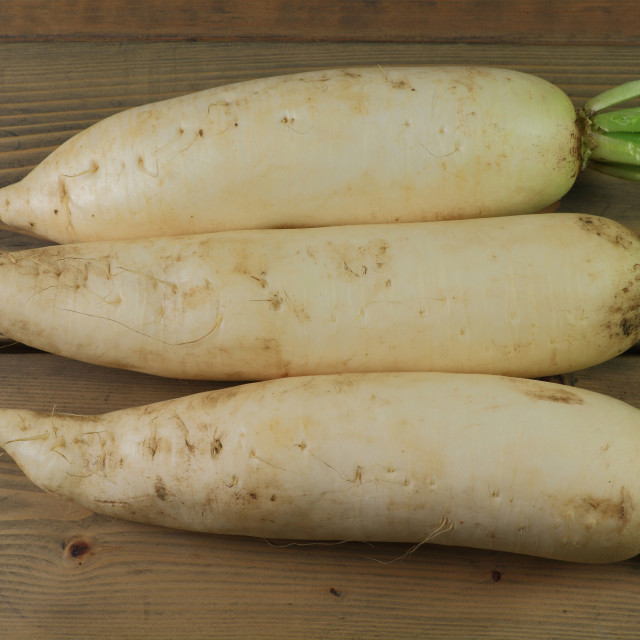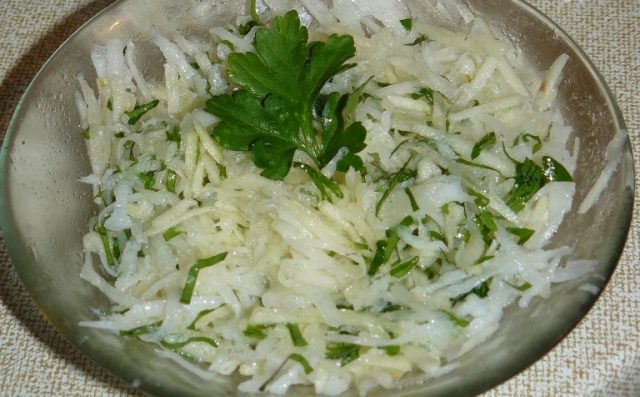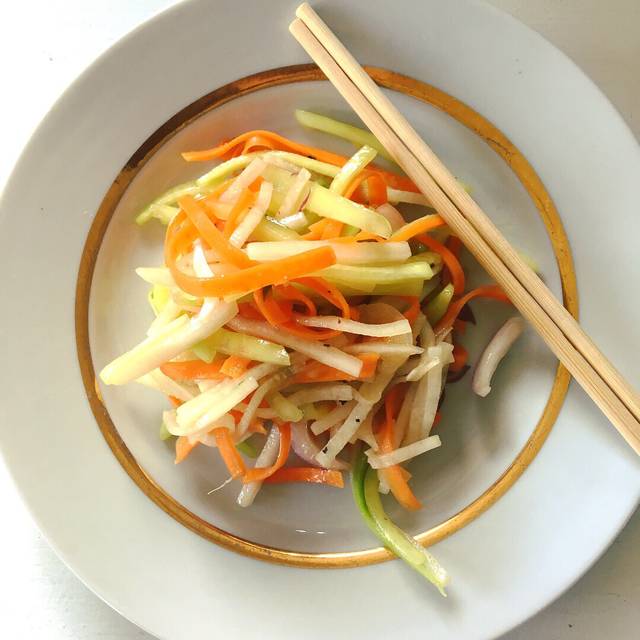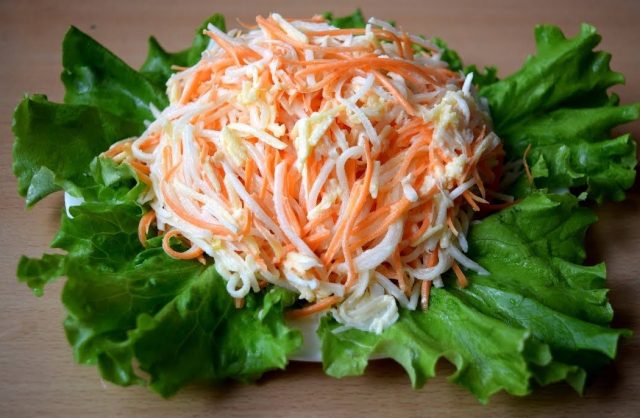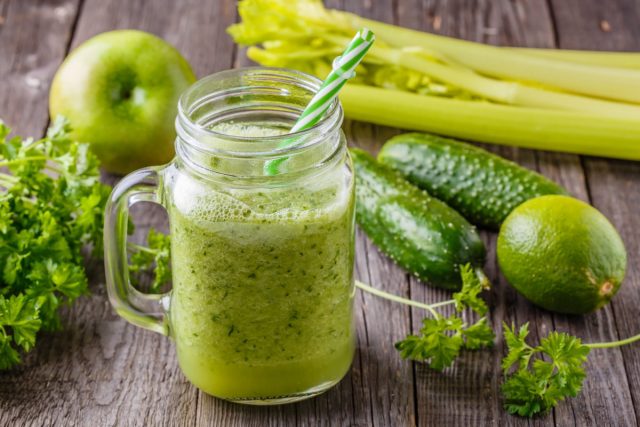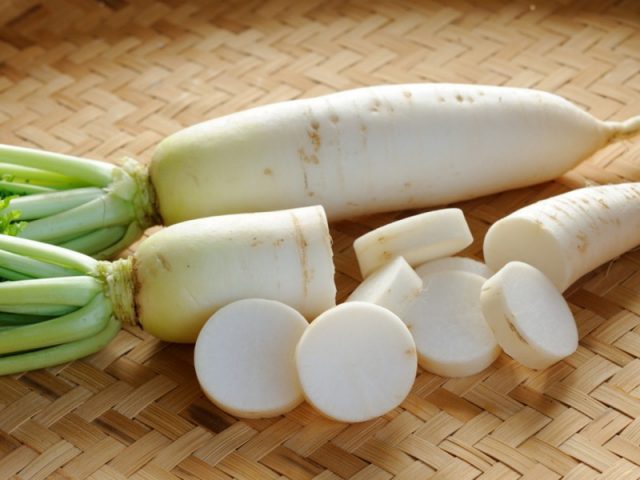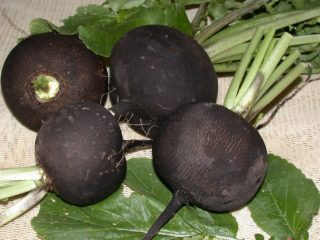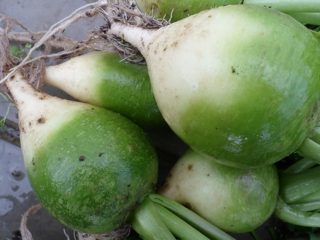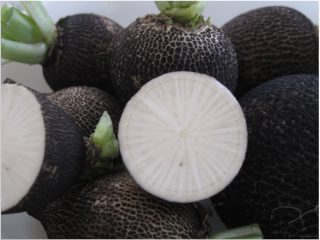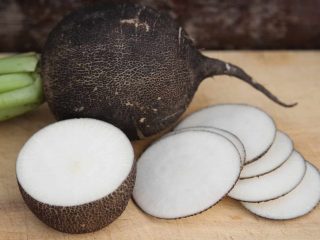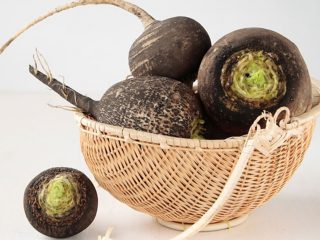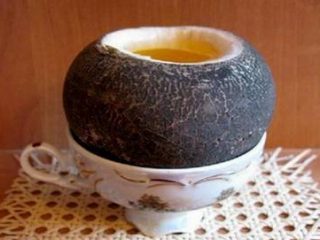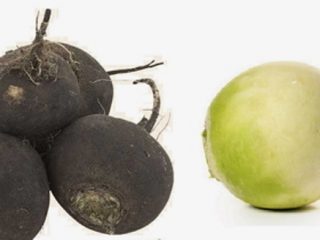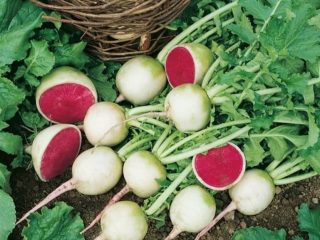Content
The benefits and harms of daikon before eating should be studied by those people who complain of some ailments. For a healthy body, this vegetable rich in vitamins and fiber will bring undoubted benefits. It tastes good and lacks the bitterness from mustard oils that is inherent in radishes or ordinary radishes. A cylindrical white root vegetable, similar in outline to carrots, but much larger in volume, due to its beneficial properties, it is also used in external treatment and cosmetology.
Composition and nutritional value of daikon
Root crops are valued for their vitamin composition, saturation with macro- and microelements, along with low calorie content, which together make up their useful properties.
The chemical composition of daikon root crops
Japanese radish contains almost all the minerals needed for excellent health:
- potassium - 280 mg;
- phosphorus - 28 mg;
- calcium - 27 mg;
- sodium - 16 mg;
- copper - 10 mg;
- magnesium - 9 mg;
- chlorine - 7 mg;
- sulfur - 5 mg;
- iron - 0.84 mg;
- manganese - 0.75 mg;
- zinc - 0.18 mg.
Two trace elements with beneficial properties for humans are measured in 100 g of daikon not in milligrams, but in micrograms:
- iodine - 2.1 mcg;
- selenium - 0.8 mcg.
Vitamin content in daikon
In the tender pulp, vitamins are well accumulated and preserved. Most of all, 30 mg, vitamin C, on which many of the beneficial properties of sweet radish are based. It turns out that 100 g of fresh vegetables will provide more than one third of the amount of the daily requirement of ascorbic acid. But not only this necessary substance is commensurate with the benefits of daikon for the human body. Contains more than 2 mg of each of the vitamins PP, E, B5. There are also other substances of group B that are valuable for the health of the nervous system:
- B1 - 0.8 mg;
- B2 - 0.2 mg;
- B6 - 0.3 mg;
- B9 - 18 mcg.
They also determine 10 μg of vitamin A and 19 μg of vitamin H.
Calorie content of daikon
White not bitter radish, in addition to the useful composition of minerals, is low in calories. 100 g of fresh product contains only 18-21 kcal. Due to its low calorie content, daikon radish is popular among those who take care of their health.
How many carbohydrates are in daikon
In the complete absence of fat in 100 g of root vegetables are:
- 1.2 g protein;
- 4.1 g of carbohydrates;
- 1.4 g fiber;
- 95.4 g of water.
Also present are starch - 0.5 g and ash - 0.8 g. For the obvious benefit and a large amount of juicy pulp, quite pleasant to the taste, many people value white lying roots as a dietary product.
Why is daikon useful for the body
Chemical components show that daikon radish is good for the body. Potassium, sodium, calcium work at the cellular level and contribute to overall health. In addition, the benefit of the vegetable is that it is rich in other substances and compounds:
- enzymes, with the help of which foods with a large amount of starch are better absorbed;
- phytoncides that inhibit the development of bacteria;
- antioxidants, which, with prolonged use, remove harmful cholesterol;
- fiber and pectins cleanse the body of toxins and remove unnecessary fluid;
- lysozymes with antiseptic properties.
The benefits of daikon radish for the body are significant, it affects with prolonged and systematic use, preferably raw. Many people value the choleretic and diuretic effect, the calming effect on the nervous system, as a prophylactic agent for oncology.
Why daikon is useful for women
By systematically consuming dishes from Japanese or Chinese radish, as the vegetable is sometimes called, which is popular for its benefits in the countries of Southeast Asia, adult women and men provide the body with the necessary vitamins and valuable fiber. The beneficial properties of daikon radish are that its low calorie content does not lead to gaining extra pounds of weight.
During pregnancy
Expectant mothers have to revise their usual diet, including the use of non-bitter white radish. Daikon is not contraindicated for pregnant women in moderation, especially at first. Its beneficial properties work positively: the diuretic effect relieves puffiness and helps to get rid of toxins, and minerals, calcium in particular, are beneficial by strengthening the teeth. But for all its recognized benefits, there are some limitations. The vegetable activates smooth muscles, the risk of termination of pregnancy increases with the constant presence of white radish in food. There may be discomfort in the intestines associated with the processes of flatulence. Sleep disorders or irritability may also be associated with a large amount of daikon in the diet. It will be enough to eat 100 g of fresh vegetable with useful diuretic properties in 3-4 days.
The sweet white radish is chopped into slices and sprinkled with sugar. Before breakfast, lunch and dinner, they drink 10 ml of juice that stands out.
When breastfeeding
Nursing mothers should not include a vegetable with beneficial properties in the diet for the first 2 months of a new life. After this time, the baby's digestive organs will already be able to perceive changes in breast milk. It happens that the baby refuses to eat when he feels a different taste. Although daikon is beneficial when breastfeeding, as it increases lactation. In any case, the product is injected in small portions and the reaction of the body is monitored - both yours and your baby.
The benefits and harms of daikon for men
The systematic use of non-bitter radish with beneficial properties increases potency in men and has a general strengthening effect. Sexual attraction increases as the body receives all the minerals and vitamins it needs. The benefits of daikon for men working at a computer or driving a car are to regulate weight and activate blood flow in the genital area,
Is it possible for daikon children
Although the vegetable is not bitter, without mustard oil, it is difficult for a child's body to digest a large amount of fiber. Fresh daikon with beneficial properties can be given only to children over 3-4 years old. They start with the smallest portions and give a limited amount if the child wishes.
The benefits of daikon for the elderly
Older people should also eat a high-fiber vegetable in moderation. Active digestion is required for good absorption. Sometimes the benefits will be greater when replacing the vegetable with juice. The beneficial properties are the same - a mild diuretic and laxative effect, saturation with valuable substances.
Why is daikon useful?
Chinese radish with useful properties is also used purposefully, seeking to cure certain diseases.
From cough
Like bitter radish, daikon is used for coughing. This beneficial property of the vegetable is based on a solid amount of phytoncides that resist the reproduction of microbes. Specific protein compounds stop further respiratory tract infection. Daikon is used in the treatment of complications of colds, flu, and bronchitis.The benefits of juice are especially important, under the influence of which sputum liquefies:
- 50 ml is mixed with 1 tsp. honey and drink before meals;
- 50 ml of daikon juice is mixed with 50 ml of carrot or apple juice, the reception is the same.
With diabetes
The glycemic index of daikon is 15 units. The vegetable gives a feeling of fullness, is useful for those who control weight gain and diabetics. Fiber regulates sugar in the body. Daikon is used in type 2 diabetes mellitus because of its beneficial properties, rich composition of minerals and vitamins, with the help of which:
- anemia is prevented;
- immunity increases;
- the work of the heart improves;
- the quality of vision is preserved;
- there is a positive effect on the nervous system.
Radish is introduced into the diet in the form of salads:
- with boiled chicken breast, stewed onions, grated carrots and daikon, which is seasoned with herbs, pepper and sour cream;
- with grated carrots and daikon, chopped bell peppers, onions, herbs, seasoned with olive oil and lemon juice.
For the liver
The vegetable compounds cleanse the bile ducts, help a healthy body to digest fatty foods, so salad made from it must be included in the list of holiday dishes. Will give daikon benefits for the liver in such a dish:
- boil and peel 150 g of shrimp;
- for the sauce, mix the juice of 2 tangerines with 4 tbsp. l. mayonnaise;
- peel off 1 apple and cut into small slices;
- 4 tangerines are divided into wedges;
- rub 100 g of daikon and season with cooked sauce.
With gout
With the development of an inflammatory gouty process, even sweet radish is not recommended to be included in the diet. Daikon for gout, like rheumatism, is used in the form of rubbing the joints: mix 30 ml of radish juice, 20 g of honey, 10 ml of 70% alcohol and put in a dark cool place for a week.
Slimming
The high amount of vitamin C helps to normalize weight With a diet, consuming 300 g of sweet radish per day will allow you to get rid of 175 calories, since it increases metabolism. Daikon for weight loss is used in salads and pre-workout cocktails:
- passed in a blender on 100 g of root vegetables and mango;
- on a hot summer evening, a refreshing smoothie is prepared from 100 g of cucumber, 100 g of root vegetables and a few sprigs of parsley.
Chinese radish is included in the diet of fasting days.
Moreover, the vegetable is able to remove radionuclides.
The benefits of daikon juice
The liquid is not so irritating to the digestive system. Therefore, given that daikon white radish is beneficial and harmful, in ambiguous cases they tend to use juice. It is taken for weight loss, often before training, since the vegetable is a natural fat burner. It is recommended to drink 50 ml of juice every day on an empty stomach for 2 weeks. It is also advised for the elderly to replace the grated vegetable with juice, which retains all the beneficial properties.
Daikon application
Japanese radish is taken as an active element for proven recipes of traditional medicine and cosmetology, taking into account the benefits of daikon and contraindications to its use.
In folk medicine
Healers advise to eat and drink daikon juice:
- removing hangover syndrome;
- activating the work of the gall and bladder;
- freeing the intestines from toxins and toxins;
- stopping cough;
- reducing inflammation in sore throats, joints and skin infections;
- healing wounds and scratches with gruel;
- reducing increased nervous excitability.
In cosmetology
Using Chinese radish as an antiseptic, juice or gruel is used as:
- cleansing lotion;
- mask for acne;
- means for whitening freckles and pigmented areas on the skin;
- balm for beauty, shine and hair growth.
How to eat daikon
Traditionally, sweet radish is included in various salads. Fresh is often made. Young green leaves can also be eaten.In China, Japan, the vegetable is pickled, boiled and stewed.
Limitations and contraindications for admission
Despite its beneficial properties, daikon brings harm even to healthy people with unlimited use. Pains and cramps in the abdomen, diarrhea, up to fever may be disturbing. The daikon is strictly forbidden for such contraindications:
- gastritis with high acidity;
- stomach ulcer;
- liver pathology;
- kidney disease.
You should give up the vegetable and those who suffer from gout.
Conclusion
The benefits and harms of daikon are well understood. In each case, the attending physician will help to resolve doubts. Anyone who has no health complaints can consume the vegetable in moderation as recommended.
